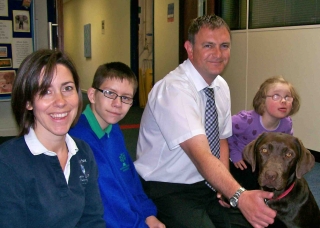'Special Dog' Blog - The Coco Academy

I’m in a classroom with 5 teenagers, one other adult and a faintly bemused Chocolate Labrador. Each of us (apart from the dog of course) has a highly scented, wine-coloured plastic bag over one hand. Giggles ensue as we attempt to collect an object from the table using the bag-covered hand with minimum effort, maximum dexterity. The bag is then turned inside out, without dropping the contents, and is tied at the top with equal concentration. Welcome to ‘The Coco Academy’.
Along with owner Head Teacher Adam Booker, Coco the Chocolate Labrador has a big responsibility. These students are developing skills that we mostly take for granted. The Academy class; Davey, Ally, Deanna, Derren and Marty, are students with special needs. All are working towards a basic diploma in safety around dogs, basic care and handling skills. On the surface, that is what they are learning. Behind this, there are skills in empathy, bonding, awareness, coordination and importantly, communication.
Coco is still a young dog. A lot of effort, fun and love has gone into creating this settled, non-reactive 1 year old. As a trainer I feel professionally delighted at the results of the work we have put in with her. As a human being I feel slightly awed by the symbiotic workings of survival. As a parent I feel warm inside that dogs and children CAN integrate safely to mutual reward.
So there is more to this than meets the eye. Returning to today’s class, a foundation course in pet care means that to succeed, students cannot neglect any duty, no matter how unpleasant. After our training exercise in ‘picking up’, the students and I decided unanimously that perfumed bags are a good invention! With humour and an essential practical element, they are learning valuable lessons - and so am I.
Although Coco is first and foremost a pet, she is registered with Canine Concern which provides relevant guidelines as part of her role as a Visiting Dog. A ‘trainee trainer’ himself, owner Adam was delighted to adopt clicker training. This was especially so when he realised the speed at which this helped Coco to learn. I will never forget his mouth dropping open in awe during one 30 second training session. We often compare stories of how motivation and negotiation win through when teaching preferred behaviours... to humans as well as dogs!
One of the students earns ‘Coco points’ for staying focused in class. The student has extensive multiple disabilities. Each ten minutes this student manages to remain calm, one Coco point is earned. Get that total to five points and she is allowed to visit and stroke Coco. The Academy class have already learned how to attach a lead and collar, walk Coco around obstacles and even attempt a mini-agility course. Of course, the rules were that all student had to negotiate the course themselves, first...!
Training in (and out) of the school with Adam and Coco has given me an enormous insight into my work. Due to extensive socialisation from an early age, Coco is amazingly fast when learning new tasks. The school bustles with a huge range of equipment, people of all shapes and sizes and a wide range of behaviours! Nevertheless, Coco stays focused and has the skill of remaining calm with all sorts of events going on around her. She is a shining example of how easy training can be when effective, ongoing socialisation is a priority. Powerful incentive!
From the students’ perspective, our challenge is to teach safe handling without overfamiliarity. UK government statistics indicate that children are most likely to receive a bite from a dog that is familiar to them. This is possibly since these children may become complacent in their behaviour around these dogs.
It has been indicated that enormous health benefits can be derived from pet ownership, so my task is to allow this relationship to develop. Safety is our ultimate consideration. We taught Coco to ‘wave’ her paw. When a student waves at Coco, she ‘waves’ back. Simple enough. The exceptional advantage of teaching this, however, is that when out and about, the students may want to greet other dogs. If they wave at the dog, and the dog does not ‘wave’ back - then they follow the rules we have laid out.
Our next training phase is to teach Coco to lie down quietly next to some students as part of their sensory stimulation programme. Allowing the youngsters to feel a warm presence near them for comfort and touch will allow them to interact with their surroundings using senses other than sight or hearing.
If each dog we raise or train is chosen carefully, integrated thoroughly, treated with calm respect and given lots of useful jobs to do, we could all have a Coco. As Ally points out in class “Not every dog is like Coco”. To my mind, every dog could be.
(Coco belongs to Head Teacher Adam Booker and works at the Willoughby School in Bourne, Lincolnshire UK, a school for children with special needs.)
Ref: McNicholas J; Collis G M (2001) Children's representations of pets in their social networks.




